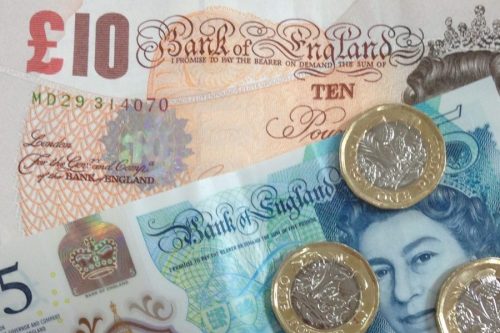Interest rates hit one per cent as Bank of England imposes 0.25% increase

Interest rates have increased again after the Bank of England today announced a 0.25% rise to one per cent.
It is the fourth time since December the Bank’s Monetary Policy Committee (MPC) has increased the cost of borrowing, which now stands at a 13-year high.
Six members (Andrew Bailey, Ben Broadbent, Jon Cunliffe, Huw Pill, Dave Ramsden and Silvana Tenreyro) voted in favour of the increase. Three members (Jonathan Haskel, Catherine L Mann and Michael Saunders) voted against, preferring to increase Bank Rate by 0.5 percentage points, to 1.25%.
The latest increase is aimed at tackling rising inflation, which rose to its highest in 30 years in March, reaching seven per cent.
This is set to increase even further, driven by soaring food, energy and fuel prices and tax increases.
There are fears inflation could reach as much as 10% later in the year – five times the Bank’s two per cent target – when energy watchdog, Ofgem, is expected to increase price cap levels again in the face of soaring energy costs driven by the rise in wholesale prices.
This has been exacerbated by Russia’s invasion of Ukraine.
Today’s interest rate increase followed the decision by the US Federal Reserve to raise its rate to a range of 0.75% to one per cent yesterday (April 4), its highest in 20 years, while the Reserve Bank of Australia revised its rate from 0.1% to 0.35% – the first rise in 11 years.
Markets expect the UK bank rate to hit 1.25% later this year, going up to 1.5% by mid-2023.
The Bank explained its decision, saying global inflationary pressures have intensified sharply following Russia’s invasion of Ukraine.
This has led to a material deterioration in the outlook for world and UK growth. These developments have exacerbated greatly the combination of adverse supply shocks that the UK and other countries continue to face.
Concerns about further supply chain disruption have also risen, both due to Russia’s invasion of Ukraine and to COVID-19 developments in China.
The MPC also warned that CPI inflation is expected to rise over the remainder of the year, to just over nine per cent in the second quarter of 2022 and averaging slightly over 10% at its peak in the fourth quarter.
Dr Tony Syme, macroeconomic expert from the University of Salford Business School, says the increase to one per cent, will not help the cost of living crisis.
He said: “Living standards are now being eroded by inflation and the policies to address it will only make the living standards crisis even worse.
“The latest rise comes a day after the Federal Reserve announced the largest increase in interest rates since 2000 and two days after the Reserve Bank of Australia raised interest rates for the first time in more than a decade. They all cite the same reason: rising inflation.
“But that pursuit of the stable prices is likely to have serious consequences on a British economy that is fundamentally unbalanced. The Bank of England is only making matters worse. It should focus on co-ordinating with the Treasury to boost business investment and raise productivity.
“That will help to raise living standards and keep domestic inflation low in the long run, while changes to government policies around skills training and migration could tackle the current labour shortage in the short run.”
He added: “A rise in living standards is driven by rises in productivity and these are sustained by business investment. But the latest figures for business investment show that it is still 8.6% lower than it was in 2019 and, following a survey of its members, the British Chambers of Commerce recently revised downwards it projection for business investment growth in 2022 by over 30%.
“Without investment to drive forward permanent increases in productivity and, in the absence of any other supply-side factors to boost the British economy, living standards can only increase via short-term boosts to demand via trade, household consumption and government expenditure.
“While Brexit has had a negative impact on the UK’s trade balance, it has been the maintenance of household consumption throughout the pandemic and the very large rise in government expenditure that has created the growth in the economy in recent times.
“Interest rate increases raise the cost of borrowing for both households and businesses. Reductions in household spending have a negative effect on the economy in the short run. Reductions in business investment have a negative effect on the economy in the long run.
“Little wonder that the GfK Consumer Confidence index is now -38, the second-lowest reading since records began almost 50 years ago, and the Institute of Directors’ economic confidence index fell from -4 in February to -36 in April.”
Federation of Small Businesses (FSB) chair, Martin McTague, said: “Small businesses are caught between a rock and a hard place: spiralling operating costs on one side, rising personal and professional debt costs on the other.
“The hope is that today’s move goes some way to putting the brakes on input price inflation in a way that hasn’t been achieved by previous rate rises, mitigating the pain of higher debt repayments.
“When we spoke to members over the first lockdown, the majority were carrying debt, and four in 10 were concerned that their debt was now ‘unmanageable’.
“Those with bounce-backs are rightly protected with a fixed rate on those facilities, but a lot of the wider personal and professional loans that small businesses and sole traders hold will move in line with the increase today.
“Microbusinesses are especially hard-hit by the cost of doing business crisis. Energy costs are particularly difficult to manage, as they are not eligible for the relief offered to consumers, and don’t benefit from the leverage that big businesses can bring to bear. As these new figures show, their fight to bounce back from COVID is that much greater than for a lot of big corporates. ”
He added: “Those with coronavirus business interruption loans will be feeling particularly apprehensive after today’s increase, which is why we’re urging government to extend Pay As You Grow options to CBILS customers to ease at least one of the mounting pressures they face.
“We’re also encouraging policymakers to look again at our debt for employee equity proposals, giving the minority who are really struggling to repay bounce-backs the option to convert to an employee ownership trust model – protecting livelihoods, improving productivity and protecting taxpayer funds in the process.
“This is a moment for the banks to step up: helping their small business and sole trader customers to manage the effects of rising rates responsibly. Widespread collapse is not good for anyone long term.”









